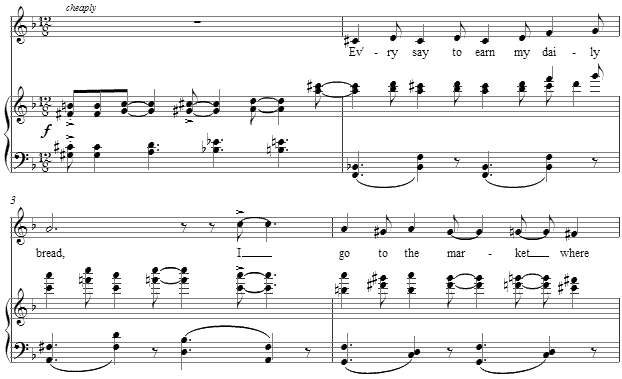Music and Texts of GARY BACHLUND
Vocal Music | Piano | Organ | Chamber Music | Orchestral | Articles and Commentary | Poems and Stories | Miscellany | FAQs
Hollywood - (1989)
Bertolt Brecht
for medium or low voice and piano
This translation and the short original text are both under copyright, and therefore not reproduced fully here.
Every day to earn my daily bread
I go to the market where lies are bought....
From Poems in Exile (1942), well translated by Michael Hamburger.

Bertolt Brecht
Bertolt Brecht (1898-1956) was German poet, playwright, and theatrical reformer, and some editorialize one of the most prominent figures in the 20th-century theatre. In his works Brecht had been concerned with encouraging audiences to think rather than becoming too involved in the story and to identify with the characters.
Brecht developed a form of drama called "epic theatre" in which ideas or didactic lessons are important. His works have been translated into many languages. He wanted his theater to represent a forum for debate rather than a place of illusions. From the Russian and Chinese theaters Brecht derived some of his basic concepts of staging and theatrical stylization, though many notions have been stretched and twisted outside his limits into a caricature of his ideas.
His concept of the Verfremdungseffekt, or V-Effekt (sometimes translated as 'alienation effect') centered on the idea of 'making strange' and thereby making poetic. He aimed to take emotion out of the production, persuade the audience to distance from the make believe characters and make the actors to dissociate from their roles. Then the political truth would be more easy to comprehend. Once he said: "Nothing is more important than learning to think crudely. Crude thinking is the thinking of great men."
Fleeing the Nazis, Brecht continued with his family through Russia to the United States, settling in Santa Monica, California. [ 1 ] In his new country Brecht tried to write for Hollywood, but the only script that found partial acceptance was Hangmen Also Die (1942).
"The intellectual isolation here is enormous," Brecht complained. "Compared to Hollywood, Svendborg was a world center." His ideas, such as "the production, distribution and enjoyment of bread," were not taken seriously by movie moguls. In 1947 Brecht was accused of un-American activities, but managed to confuse with half-truths J. Parnell Thomas, the chairman of the House Committee on Un-American Activities, who praised Brecht for being an exemplary witness. However, he flew to Switzerland, without waiting for the opening of his play Galileo in New York.
Having spent much of my life on the periphery of Hollywood and environs, I conclude that Brecht -- as with Schoenberg and Heinrich Mann -- could not have easily collaborated in Hollywood as did so many other expatriates, many wonderful musicians having also fled the Nazis and the murderous ends of National Socialism. And so Brecht condemns the many in Hollywood, without considering his own part in that so-called "intellectual isolation." This alone tells much of his personality. Like so many artists, his work stands apart from the man as man.
This little poem which I set in English bemoans Brecht's view that Hollywood was a place where "lies are bought." It seems from then until today, that perception of Hollywood remains rather consistent. Moreover, the ironic end to Brecht's political stand is that his works have created a large profit for his heirs, who continue to guard the theaters which represent their "capital" assets, just as did Hollywood theirs. As to that "intellectual isolation," one may collaborate with others only when one allows others their own ideas too, and this was something which was rather foreign to Brecht's notion of his own importance.
The setting of this ironic text was a gift to the ensemble cast of LA Opera's The Rise and Fall of the City Mahagonny, directed by Jonathan Miller, in which I had the good fortune to portray Jimmy. Anna Steiger was a sympathetic Jenny, and the remainder of the cast was genuinely superb, all drawn from local talent in southern California.
The score to Hollywood is available as a free PDF download, and Hamburger's text still remains under copyright in the EU as in the United States. Therefore this PDF is made available only for academic and other study purposes. Click on the graphic below for this piano-vocal score.
NOTES
[ 1 ] Santa Monica, where I lived for some time in my young adult days, was also home for some time to German author Heinrich Mann, brother of Thomas Mann, among other notables.
Expatriates fleeing the Nazis comprised a great gift to Hollywood as an industry and to the cultural life of southern California. In addition southern California was home for a time to Billy Wilder, Alfred Hitchcock, Igor Stravinsky, Arnold Schoenberg (who instructed at UCLA), Sergei Rachmaninoff, as well as virtuosi like Jascha Heifetz and Gregor Piatagorsky. The list of luminaries who were able to work in Hollywood -- where Brecht found only "intellectual isolation" -- is simply too lengthy to include herein.
What seems clear in hindsight was that Brecht could not make himself an "intellectual" home, where major contributors in so many artistic fields of endeavor had, for personal reasons which did not include Hollywood itself at that time.

